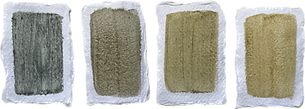Polly Bennett
ArtHouse Jersey Artist Residency 2023
I was invited by artist and ArtHouse Jersey producer Laura Hudson to be Artist in Residence during the exhibition of the Trinity Buoy Wharf Drawing Prize. The residency focused on collecting natural materials for pigment making, teaching about these pigments and sharing techniques for using them.
Prior to my visit to Jersey, I conducted extensive geological research to identify the most promising locations for pigment hunting. The most successful discovery came with the guidance of local geologist Ralph Nichols, who directed me to La Rocque at low tide. There, I collected blue, green and yellow clay, forming the basis for a new palette of site-specific pigments.






Workshops Held During the Residency
Field Trip & Pigment Making Workshop
Participants foraged and processed earth, metal, and bone-based materials, exploring techniques to help identify pigment specimens in the landscape.
Natural Drawing Workshop
This experimental session invited participants to use natural and collected materials in response to The Trinity Buoy Wharf Drawing Prize exhibition. Tools and techniques included water pens, sponges, putty rubbers, fingers, carved sticks, beeswax, sandpaper, spray bottles, brick, charcoal, wet clay, files, feather pens, rust, and oak gall ink.




The findings from my time in Jersey culminated in a colour map of the island, featuring ten corresponding raw pigments - brick, charcoal, rust, clay, ochre, and shell - and a series of watercolour paints housed in ceramic palettes made by Laura. COLOURS was printed by Tim of Luddite Press using a letterpress.



